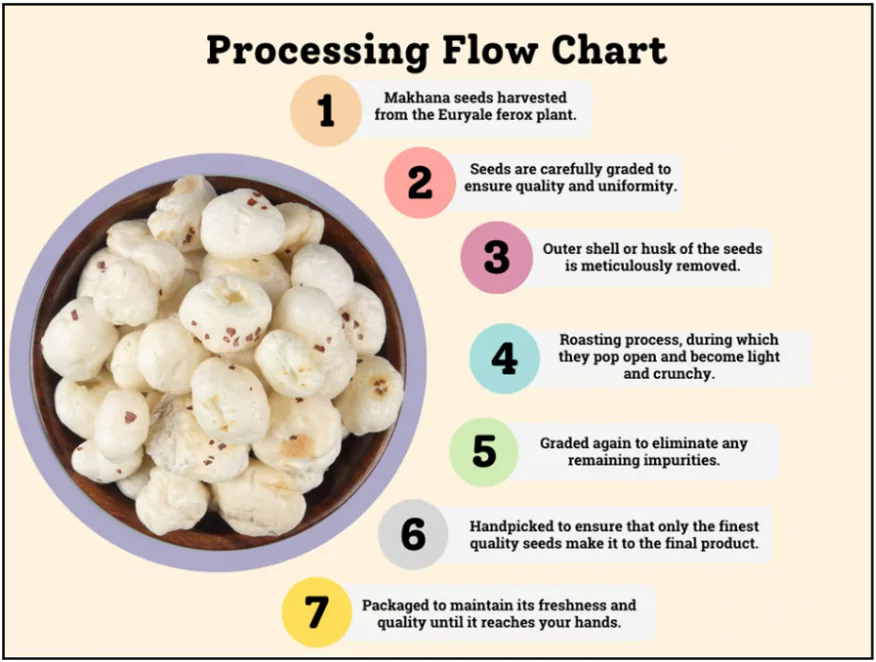Union Finance Minister Nirmala Sitharaman announced the establishment of a Makhana Board in Bihar.
About Makhana (Fox Nuts)

- Makhana, also known as fox nut, is the dried edible seed of the prickly water lily (Euryale ferox).
- It is found in freshwater bodies across South and East Asia.
- The plant is recognized for its violet and white flowers and large round prickly leaves, often exceeding one meter in diameter.
- Due to its dark outer layer, Makhana is referred to as the ‘Black Diamond’.
Nutritional Value and Uses
- Makhana is low in fat, high in carbohydrates, and a good source of protein.
- It is rich in minerals and is widely used in:
- Traditional medicine
- Health and wellness products
- Snacks and culinary preparations such as commonly consumed as popped Makhana, also called ‘Lava’.
Enroll now for UPSC Online Course
Major Producing Regions
- Bihar accounts for 90% of India’s total Makhana production.
- The main producing districts in Bihar include:
- Darbhanga, Madhubani, Purnea, Katihar, Saharsa, Supaul, Araria, Kishanganj, and Sitamarhi (Mithilanchal region).
- The first four districts contribute to 80% of Bihar’s total Makhana output.
- Geographical Indication (GI) Tag: Mithila Makhana received the Geographical Indication (GI) tag in 2022.
- Other states cultivating Makhana include: Assam, Manipur, West Bengal, Tripura, and Odisha.
- Makhana is also grown in Nepal, Bangladesh, China, Japan, and Korea.
- The Bihar government has been advocating for Minimum Support Price (MSP) for Makhana.
Climatic Conditions for Makhana Cultivation
- Makhana is an aquatic crop that thrives in tropical and subtropical regions.
- It is cultivated in stagnant water bodies such as ponds, lakes, ditches, wetlands, and land depressions with water depths of 4-6 feet.
- Ideal climatic conditions:
-
- Temperature Range: 20°C – 35°C
- Relative Humidity: 50% – 90%
- Annual Rainfall: 100 – 250 cm
About Makahan Board
- The Makhana Board is set to be arranged with a budget of ₹100 crore.
- The board will provide training, financial assistance, and access to government schemes for Makhana farmers.
- The board aims to boost production, processing, value addition, and marketing of Makhana (Fox Nuts).
Check Out UPSC NCERT Textbooks From PW Store
Significance of the ‘Makhana Board’
- Bihar’s Export Challenges:
- Although Bihar is the largest producer, Punjab and Assam are the largest exporters of Makhana.
- Punjab does not even cultivate Makhana, yet leads in exports due to better processing infrastructure.
- Bihar lacks food processing units, export infrastructure, and cargo facilities at airports.
- Low Productivity and High Costs: Makhana cultivation is labor-intensive and costly.
- Farmers have not widely adopted high-yield varieties like Swarna Vaidehi and Sabour Makhana-1.
Role of the Makhana Board
- Train farmers to improve production techniques.
- Promote investment in the food processing sector.
- Develop export infrastructure to increase global market reach.
- Ensure better financial incentives and MSP for Makhana farmers.
Makhana under ODOP
- Makhana is recognized as an ODOP product under the One District One Product (ODOP) scheme.
- The Union government provides subsidies to Makhana processors for:
- Branding and marketing.
- Infrastructure development in Bihar
Enroll now for UPSC Online Classes
One District One Product (ODOP) Scheme
- The ODOP scheme was launched by the Ministry of Food Processing Industries to promote district-level economic growth.
- It aims to maximize each district’s potential, support local businesses, and create employment opportunities, especially in rural areas.
- The initiative is aligned with the ‘Atmanirbhar Bharat’ vision, fostering self-reliance and regional economic development.
- Origin: First launched on January 24, 2018, by the Uttar Pradesh Government to boost district-based industries.
- Due to its success, it was adopted by the Central Government as a national initiative.
- Implementation: The scheme is implemented alongside the ‘Districts as Export Hubs’ (DEH) initiative, managed by the Directorate General of Foreign Trade (DGFT), Department of Commerce.
- The Department for Promotion of Industry and Internal Trade (DPIIT) plays a crucial role in implementation.
Significance of ODOP: Aims to turn every district into an export hub by scaling manufacturing and supporting local businesses.
- Encourages domestic and global trade by connecting local manufacturers with foreign markets.
|
Ready to boost your UPSC 2025 preparation? Join PW’s UPSC online courses today!
![]() 3 Feb 2025
3 Feb 2025

